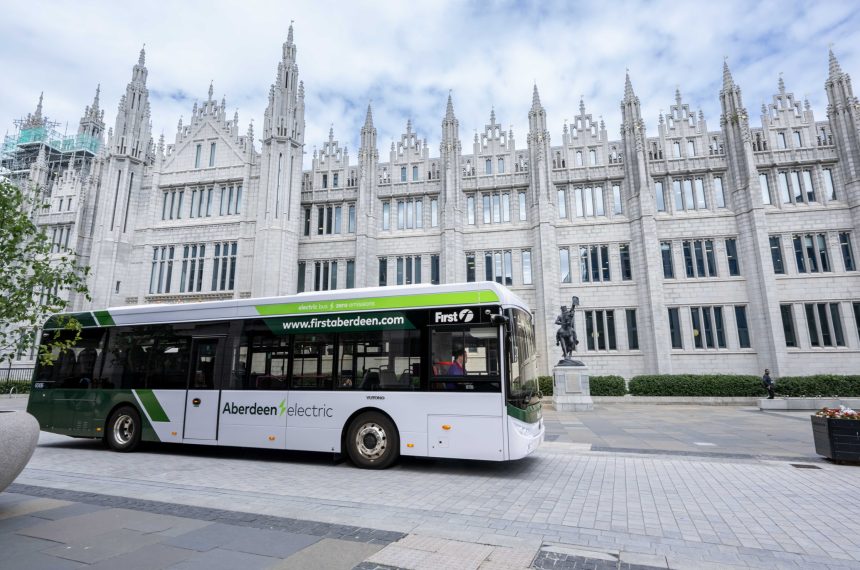Industry and local authority representatives say the Scottish Government’s decision to pause the allocation of funding via the Bus Partnership Fund (BPF) in 2024/25 will jeopardise the introduction of planned bus priority projects.
Holyrood has blamed budgetary constraints for the adjournment, which will – according to the Confederation of Passenger Transport (CPT) – stall 17 projects which are ready to start.
The government has already come in for criticism over the fact that only £26.9 million of the £500 million set aside for BPF has been awarded since its launch in 2020.
Paul White, Director of CPT Scotland, says: “The Bus Partnership Fund was a landmark announcement, demonstrating the Scottish Government’s commitment to supporting bus and growing bus use. It could still be the catalyst for partnerships across Scotland, facilitating bus priority projects that deliver social and economic benefits, as well as contributing to wider government objectives.
“Over the past four years, operators and authorities have invested heavily in developing fund bids, 17 of which are ready to commence. To pause the fund at this stage, is counter to the government’s National Transport Strategy priorities and leaves partnerships across the country in limbo, to say nothing of the impact on bus users. CPT will continue to press the Scottish Government to reconsider this decision, or to set out how partnerships continue productively through this financial year in the absence of any national funding support.”
Councillor Scott Arthur, City of Edinburgh’s Transport and Environment Convener, says the move puts at risk the capital’s bid for funding of around £200 million of bus priority measures. The plan, which has already received just over £3 million in BPF funding for preparatory work, was to improve bus services on eight arterial routes into the city centre and on two orbital routes, which could have reduced journey times by 25%, it is claimed.
Cllr Arthur says: “When I heard it was getting paused, it was awful news. It underpins so much of what we want to do here. It’s a step in the wrong direction. I really hope they reconsider because the budget’s not set yet.
He says the decision harms Scottish Government plans to reduce car use by 20% and the Council’s own target to reduce such by 30% by 2030. He adds: “I don’t see how they can hit that 20% reduction target, which was already going to be really challenging, without the Bus Partnership money.”
Robert Andrew, Chair of the Highland Bus Service Improvement Partnership (BSIP) Steering Group and of the North East Bus Alliance, was also disappointed to hear confirmation of the fund on 16 January and has aired his frustration in a letter to the Government’s agency, Transport Scotland, on behalf of the former group.
Around £12 million of the BPF monies allocated thus far has gone to Aberdeen via that North East scheme. Since introduction of the measures introduced as a result, which have included bus gates, bus journey times have been cut by 25%, the cost savings allowing First Aberdeen and Stagecoach North Scotland to offer free travel on weekends in January.
Among the many successes of the Highland BPF, according to Mr Andrew, was the upgrade of 26 traffic lights in Inverness with Adaptive Traffic Priority. He also refers to the Raigmore Bus Gate, which is due to open in March.
Mr Andrew, a former Stagecoach regional director of Wales and Scotland, says: “Until the [Aberdeen] bus gates opened, Stagecoach were talking about taking 10-15 minutes to get a bus out of the bus station. Both partnerships have shown they can make meaningful differences when there’s a will to actually give benefits to bus services and particularly bus users and both are wanting to build on that and take it to the next level.”
Among the projects planned is a “shovel-ready” one to target congestion around Fort William. Mr Andrew says: “That one just might not happen at all if there’s no funding stream in 2024/25. That’s bitterly disappointing if something that’s nearly ready to go can’t proceed and that’s currently the case.
“A lot of time and effort and public money has been spent getting projects to this stage with no obvious way of getting them to be real live projects. Sadly, quite a number of consultants have earned quite a bit of money through [the bid process], but we’re not actually going to see the fruits of their labours delivered on the ground in the foreseeable future.”
A Transport Scotland spokesperson says: “Our firm commitment to bus continues with almost £430 million in funding for concessionary travel and bus services planned for 2024/25.
“This will see investment of over £370 million to support concessionary bus travel, providing access to free bus travel for over two million people, funding of almost £50 million to help ensure our bus operators can continue to provide access to affordable transport, and around £6 million to continue our support for the Community Bus Fund.
“Given the budgetary constraints faced, the Bus Partnership Fund will be paused for next year. Fund spend will proceed as planned for 2023/24 to complete the delivery of the bus infrastructure under way for the benefit of passengers and operators, and conclude appraisal work under way that could inform future investment. This pausing presents an opportunity to recast bus priority projects within the wider work to be undertaken to deliver on our vision for the future of public transport.”



























